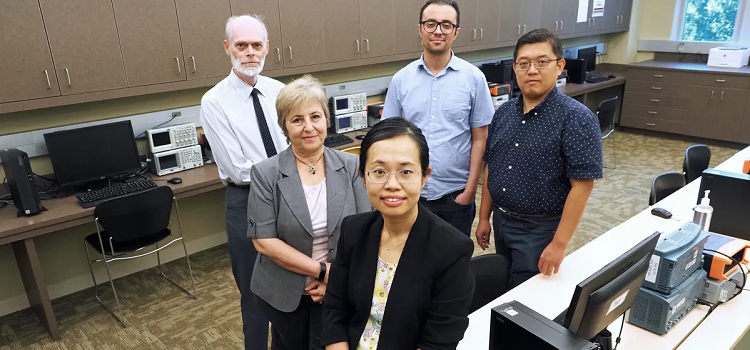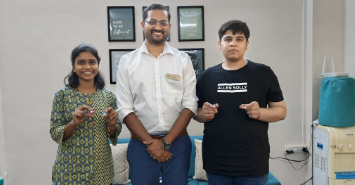The Edge of Artificial Intelligence
Posted on August 11, 2022 by Thomas Becnel

For Dr. Na Gong, Warren Nicholson professor of electrical and computer engineering at the University of South Alabama, a $6 million National Science Foundation grant offers a chance to work with “Edge AI” and some of the latest techniques in artificial intelligence.
Currently, the smartest computer systems require Internet access, remote mainframes and delays in making decisions and predictions. There are also security and privacy concerns. One of the technical challenges for the future of artificial intelligence is real-time collection and analysis of data directly on phones, watches, and other portable devices.
Members of the NSF project will spend the next four years developing new AI algorithms, microchips, sensors, and devices to achieve this goal. As a test of their new technology, they will design a smart, wearable device to predict the onset of diabetes without the need for an internet connection or a doctor to interpret results.
“This is the most amazing opportunity for me and for our team,” said
Gong, who joined the faculty at South in 2018. “It’s very exciting to have this opportunity!
We were awarded Aug. 1, and we’re already getting started.
“We’ll have a kickoff meeting on Sept. 27. Including South, we have six universities, 15 professors, and several private-sector partners to work together. So many different people with different backgrounds,” she said.
Gong said the new NSF project has three goals.
“The first one is the research, which is our focus,” Gong said. “The second one is workforce development – we’ll have a pipeline for students starting with high schools. The third one is economic development, working with private-sector partners in Alabama, Arkansas, and North Dakota.”
Collaborating institutions on the NSF grant include North Dakota State University, the University of Arkansas, the University of North Dakota, Alabama A&M University and Nueta Hidatsa Sahnish College. The program will also develop an Education-to-Workforce Pipeline beginning with high school students to college undergraduates, graduate and post-doctoral researchers, junior faculty and industry practitioners.
Colleagues at South working on the program include Dr. Jinhui Wang, associate professor of electrical and computer engineering; Dr. Hulya Kirkici, professor and department chair of electrical and computer engineering; Dr. Clive Woods, professor of electrical and computer engineering and associate dean of engineering; Dr. Mohamed Shaban, assistant professor of electrical and computer engineering; Dr. Shenghua Zha, assistant professor of counseling and instructional sciences; Dr. Roma Hanks, professor and department chair of sociology, anthropology and social work; and Dr. Wilburn Bolton, assistant professor of internal medicine.
-

Dr. Woods and Dr. Wu honored by MACE awards
This year, two prominent faculty from the College of Engineering are r...
March 3, 2025 -

Launching a Career
Launching a Career...
August 8, 2024 -

USA Engineering Professor Receives New NSF Grant for Novel AI Computing Systems
A new $275,000 project entitled "Carbohydrate Memristor Empowered...
August 13, 2024 -

South Launches New Faculty Ambassador Program
South Launches New Faculty Ambassador Program...
July 30, 2024
